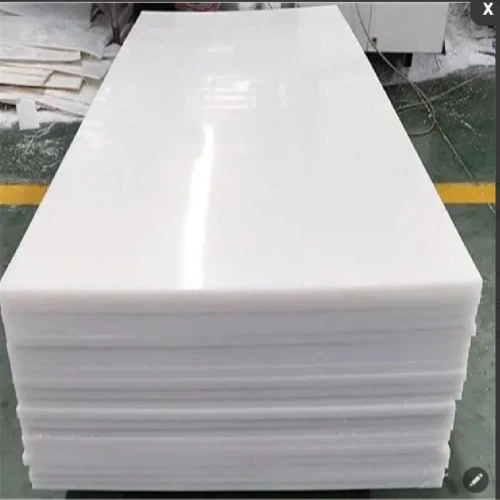 As environmental concerns grow, there’s a shift towards sustainable agriculture, with farmers adopting technologies that boost productivity while conserving resources. High-density polyethylene (HDPE) sheets are becoming popular due to their durability and versatility, offering solutions like pond lining and greenhouse coverings, enhancing sustainability and performance in agriculture.
As environmental concerns grow, there’s a shift towards sustainable agriculture, with farmers adopting technologies that boost productivity while conserving resources. High-density polyethylene (HDPE) sheets are becoming popular due to their durability and versatility, offering solutions like pond lining and greenhouse coverings, enhancing sustainability and performance in agriculture.
This blog post explores how HDPE sheets in agriculture are reshaping farming methods to enhance sustainability and efficiency.
Understanding HDPE Sheets
High Density
The high-density nature of HDPE imparts enhanced strength and durability to the sheets. This property ensures that they can endure the rigors of agricultural use without succumbing to wear and tear.
Chemical Resistance
One of the standout features of HDPE is its immunity to a wide range of chemicals, including those commonly used in agriculture, like fertilizers and pesticides. This resistance prevents degradation and leaching, safeguarding both the material and the environment.
UV Resistance
Exposure to the sun can degrade many materials, but HDPE is designed to maintain its properties even under prolonged UV exposure. This UV resistance ensures the long-term performance of HDPE sheets, making them a cost-effective choice for outdoor agricultural applications.
Flexibility
HDPE sheets are incredibly flexible, allowing them to adapt to various shapes and sizes. This flexibility aids in easy installation and maintenance, enabling farmers to use HDPE sheets in diverse agricultural settings without hassle.
Uses of HDPE Sheets in Agriculture
HDPE sheets’ uses in agriculture offer versatile solutions that enhance both productivity and sustainability.
Pond Lining
Water management is critical in agriculture, and HDPE sheets serve as excellent pond liners. They prevent water loss through seepage and evaporation, thus maximizing water efficiency. By maintaining water quality and temperature, HDPE-lined ponds create optimal conditions for aquaculture and irrigation.
Silo Construction
HDPE sheets are vital in constructing silos, offering durability and resistance to pests and rodents. This protection ensures stored crops and feed remain uncontaminated, maintaining their quality and extending their shelf life.
Protective Coverings for Greenhouses and Tunnels
In greenhouses, HDPE sheets regulate temperature and humidity, optimizing conditions for crop growth. They also act as barriers against pests and diseases, enabling year-round cultivation with increased productivity.
Irrigation Channels
HDPE sheets and pipes are crucial in agriculture, as they line irrigation channels to reduce water loss and prevent soil erosion. This efficiency in water management helps conserve vital resources and maintain soil fertility, supporting sustainable agricultural practices.
Environmental Impact and Sustainability
Reduced Chemical Usage
By providing effective barriers against pests and weeds, HDPE sheets minimize the need for chemical pesticides and herbicides. This reduction in chemical use promotes eco-friendly farming and protects surrounding ecosystems.
Water Conservation
HDPE sheets play a crucial role in conserving water. Their use in pond lining and irrigation channels ensures efficient water usage, which is vital in regions facing water scarcity.
Soil Conservation
Preventing soil erosion and nutrient loss is essential for maintaining soil health. HDPE sheets protect the soil structure, preserving its fertility and supporting sustainable farming practices.
Sustainable Farming Practices
Overall, HDPE sheets promote eco-friendly and sustainable agriculture. Their durability and recyclability reduce the carbon footprint of farming operations, aligning with global efforts to achieve sustainability in agriculture.
Challenges and Considerations
Installation and Maintenance
While HDPE sheets offer numerous benefits, proper installation and regular maintenance are essential for optimal performance. Farmers must be diligent in following installation guidelines to ensure the longevity of HDPE applications.
Cost-Benefit Analysis
Initially, the investment in HDPE sheets may seem significant. However, the long-term savings in resource conservation, reduced chemical use, and increased crop yields often outweigh the initial costs.
Local Regulations and Standards
Farmers must adhere to local regulations and standards when using HDPE sheets in agriculture. Understanding these guidelines ensures compliance and maximizes the benefits of this sustainable solution.
Get a Quote on High-Quality HDPE Sheets from Canada Plastics and Belting Inc.
HDPE sheets represent a sustainable solution for modern agriculture, offering a myriad of benefits for farmers seeking to enhance efficiency and environmental stewardship. From pond lining to silo construction, HDPE’s applications are diverse and impactful.
For those ready to transform their operations, contact Canada Plastics and Belting Inc. to explore high-quality HDPE sheets tailored to your agricultural needs.
Related Product: HDPE SHEETS
